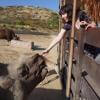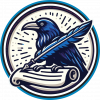We’re proud to introduce Alyssa Bohart, the recipient of the WILDBEAR Award, the first WILDLABS Award in partnership with The Brun Bear Foundation.

When we opened applications for the WILDBEAR Award in 2021 alongside The Brun Bear Foundation, we aimed to fill the funding gaps and connect the puzzle pieces of an awardee’s project, driving them toward success, as well as provide a platform to share their ongoing work and connect with conservation tech experts. Our awardee would play a role not only in advancing bear studies with technology and raising awareness for bear conservation, but in helping others put tech solutions into practice for bears through the power of our conservation tech community.
As our first awardee, Alyssa Bohart’s human-wildlife project tracking grizzly bears in Canada is a wonderful example of how meeting crucial needs like funding gaps can allow great conservation tech work to reach the next level. And importantly, Alyssa’s project has potential to create real impact in the conservation world, both through immediate data collection and in the human-wildlife projects it may inspire in the future through its example.

In her application, Alyssa explained the importance of collecting data on this bear population, saying “Grizzly bears are listed as Threatened in Alberta, Canada, with the main risk being increased human-bear interactions. Kananaskis, Alberta is one of the Bear Management Areas with a high concentration of grizzly bears and human recreation use, with several incidents of human-wildlife conflict each year. There has been an increase in human recreation within Kananaskis, and within grizzly bear home ranges, including activities like front country and backcountry camping, hiking, snowshoeing, and skiing.”
Alyssa’s project has already collected significant data on bears in this region using tracking technology. As Alyssa explained, “We use satellite-linked GPS collars with telemetry to track the bears within our study area and reduce human-wildlife conflict within high human-use areas. Within the short-term, we then either conditioned bears away from people or managed people by keeping them away from bears.
Additionally, we used [a data collection] app to collect bear sighting information, whether through observation, telemetry, or aversive conditioning events. Using the GPS data and app sightings, we were able to create long-term solutions by identifying areas where bears frequent to inform management and future development plans to reduce conflict.”

The Brun Bear Foundation founder Edwin Lampert said of selecting Alyssa as our awardee, “We were impressed by the breadth of Alyssa's experience, personal commitment, and obvious passion for both animal welfare and the use of technology as an enhancer - for the bears and their quality of life, and our understanding of these majestic animals. Alyssa made her case with clarity and conviction and we were persuaded that the WILDBEAR Award would make a difference - maybe even the difference - in the vital work she is doing in tracking vulnerable, non-human-habituated grizzly bears.”
With such effective data collection in these areas used frequently by humans already, the project’s next phase is understanding how bears in the region currently use areas proposed for development, helping to proactively prevent conflict. Alyssa told us that the WILDBEAR Award funds would allow for Iridium data uploads from GPS collars on bears in proposed development areas, providing insight into potential conflicts.
Additionally, this data opens up the possibility for Alyssa to provide movement data for non-human habituated bears - and this data can be compared to human-habituated, previously collared bears, allowing for more in-depth behavioural understanding of this population.

Much like our team here at WILDLABS, Edwin and The Brun Bear Foundation team are optimistic about what Alyssa’s work represents for the bear conservation community. He says, “This is the inaugural WILDBEAR Award and we are committed to making it the first of many. We are confident others will draw inspiration from the project in itself, and also from the fact that well thought-out projects in need of relatively small funding to meet gaps, when presented clearly and with conviction, can attract more funding and wider support too. We look forward to learning of Alyssa's progress, forging a connection that goes beyond the life of this award, and supporting many more projects in the future.”

As Alyssa’s project progresses throughout 2022, our community will have the opportunity to get to know her and her work with grizzly bears. In addition, we hope to bring together others in the bear community to learn and collaborate together alongside Alyssa, connecting our bear-focused members to discuss technologies in relevant spaces like biologging, machine learning, camera trapping, and more.
Stay tuned to WILDLABS and The Brun Bear Foundation throughout 2022 for more WILDBEAR Award updates, and to learn from Alyssa and her bears!





Add the first post in this thread.